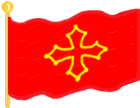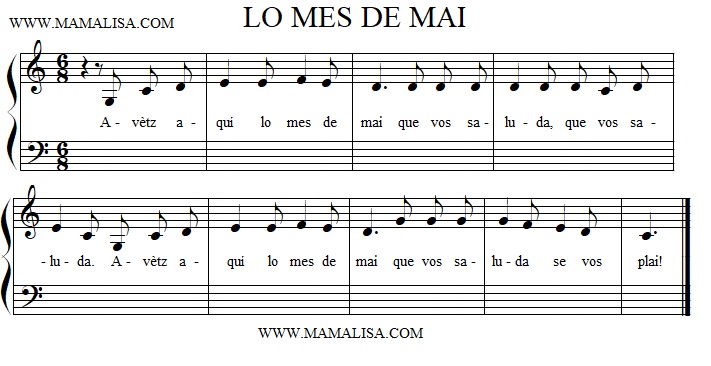Lo mes de mai
Lo mes de mai
Here Is The Month of May
May Song
May Song
(Occitan)
(English)
Avètz aquí lo mes de mai (1),
Que vos saluda
Que vos saluda
Avètz aquí lo mes de mai,
Que vos saluda se vos plai !
Agachatz plan al bujalet (2),
Se n'i a cinc uòus,
Se n'i a cinc uòus.
Agachatz plan al bujalet,
Se n'i a cinc uòus, balhatz ne tres !
Agachatz plan al tirador,
Se n'i a cinc sòus,
Se n'i a cinc sòus.
Agachatz plan al tirador,
Se n'i a cinc sòus, balhatz ne dos !
Agachatz plan a la travada,
Se n'i a de lard,
Se n'i a de lard.
Agachatz plan a la travada,
Se n'i a de lard farem pascada (3) !
Avètz aquí lo mes de mai,
Que vos saluda,
Que vos saluda.
Avètz aquí lo mes de mai,
Que vos profite s'a Dieu plai !
Here is the month of May (1)
That greets you,
That greets you.
Here is the month of May
That greets you, if it pleases you!
Look well into the nest (2)
If there are five eggs
If there are five eggs.
Look well into the nest
If there are five eggs, give (us) three!
Look well into the drawer,
If there are five dimes (or pence),
If there are five dimes (or pence)
Look well into the drawer,
If there are five dimes (or pence), give (us) two!
Look well at the beam (3),
If there is lard,
If there is lard.
Look well at the beam,
If there is lard, we'll make an omelet (4)!
Here is the month of May
That greets you,
That greets you.
Here is the month of May
Make the most of it, God willing!
Notes
(1) Literally "You have here…"
(2) Bujalet/bojalet, literally, "little hole/opening/gap…"
(3) The beam - Monique wrote, "In the countryside, when they could, people raised a pig. When they killed it (or had it killed) the sausage, ham, bacon etc. (all the cold meats that can be kept in the open air, in fact) were hung from the beams, often those on the ceiling of the attic or in a room fresh and dry (if it's damp, it rots) and safe from rodents (no one wants to find just the ham bone because the mice just left that and the string!)."
(4) A "pascada" is either an omelet or a pancake made with eggs, milk and flour, with or without sugar. Its name comes from "Pascas" (Easter) because people used to make it with the eggs laid and not eaten during Lent.

Thanks and Acknowledgements
Translated by Monique Palomares.

























